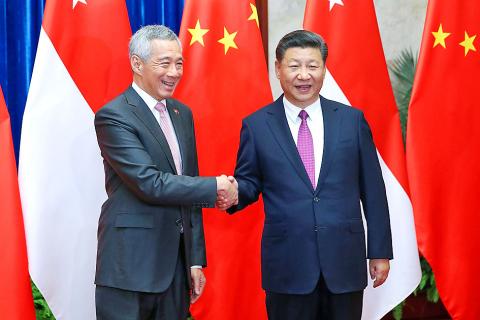The Presidential Office yesterday declined to comment on media reports that Singapore would stop sending troops to Taiwan to participate in a long-running joint military exercise, saying only that the government greatly values its friendship with Singapore.
“The government greatly values its long and strong friendship with Singapore. The Presidential Office has no comment on baseless news reports,” Presidential Office spokesman Alex Huang (黃重諺) said in response to media requests for comment on Singapore’s rumored plan to end military exchanges with Taiwan.
Ministry of National Defense spokesman Major General Chen Chung-chi (陳中吉) also declined to comment on the news, calling it speculation.

Photo: AFP
In 1974, then-president Chiang Kai-shek (蔣介石) agreed to then-Singaporean prime minister Lee Kuan Yew’s (李光耀) request for the Singaporean military to be trained by the Republic of China’s armed forces in Taiwan due to the city-state’s limited space.
Chiang’s son, then-premier Chiang Ching-kuo (蔣經國), in 1975 signed an agreement with Lee and initiated the partnership, codenamed “Project Starlight” (星光計畫), in which Singapore sent troops to Taiwan to receive military training.
The project has continued to this day and has taken on the form of a joint military exercise after Taiwan helped the Singaporean military develop its defense capabilities.
Former deputy minister of national defense Lin Chong-pin (林中斌) yesterday said word of the rumored plan was passed on to him by a reporter in Hong Kong.
If true, the significance behind Singapore’s decision to end its military exchanges with Taiwan following a meeting between Chinese President Xi Jinping (習近平) and Singaporean Prime Minister Lee Hsien Loong (李顯龍) would be “self-explanatory,” Lin added.
Democratic Progressive Party Legislator Tsai Shih-ying (蔡適應) yesterday said there have been several signs that Singapore would back out of Project Starlight.
The most obvious reason is that China has been pressuring Singapore to end its military exchanges with Taiwan to limit the nation’s international space, he said.
That Singaporean troops receiving training in Taiwan was a topic of discussion between Xi and Lee Hsien Loong was likely a hint that the speculation is true, Tsai said, adding that joint military drills by Taiwan and Singapore have been protested by Taiwanese.
The Singaporean government has invested A$2.2 billion (US$1.75 billion) to build a military base in Queensland after it signed the Comprehensive Strategic Partnership agreement with Australia and has set plans in motion to move its troops from Taiwan to Australia, where there would be more space to conduct military drills, he said.
Tsai said while he hopes that Singapore would maintain a level of military exchanges with Taiwan, he could understand why the Singaporean government might feel that it is “inconvenient” to continue training its armed forces in Taiwan, given the circumstances.

Intelligence agents have recorded 510,000 instances of “controversial information” being spread online by the Chinese Communist Party (CCP) so far this year, the National Security Bureau (NSB) said in a report yesterday, as it warned of artificial intelligence (AI) being employed to generate destabilizing misinformation. The bureau submitted a written report to the Legislative Yuan in preparation for National Security Bureau Director-General Tsai Ming-yen’s (蔡明彥) appearance before the Foreign Affairs and National Defense Committee today. The CCP has been using cognitive warfare to divide Taiwanese society by commenting on controversial issues such as Taiwan Semiconductor Manufacturing Co’s (TSMC, 台積電) investments in the

INVESTIGATION: The case is the latest instance of a DPP figure being implicated in an espionage network accused of allegedly leaking information to Chinese intelligence Democratic Progressive Party (DPP) member Ho Jen-chieh (何仁傑) was detained and held incommunicado yesterday on suspicion of spying for China during his tenure as assistant to then-minister of foreign affairs Joseph Wu (吳釗燮). The Taipei District Prosecutors’ Office said Ho was implicated during its investigation into alleged spying activities by former Presidential Office consultant Wu Shang-yu (吳尚雨). Prosecutors said there is reason to believe Ho breached the National Security Act (國家安全法) by leaking classified Ministry of Foreign Affairs information to Chinese intelligence. Following interrogation, prosecutors petitioned the Taipei District Court to detain Ho, citing concerns over potential collusion or tampering of evidence. The

‘COMPREHENSIVE PLAN’: Lin Chia-lung said that the government was ready to talk about a variety of issues, including investment in and purchases from the US The National Stabilization Fund (NSF) yesterday announced that it would step in to staunch stock market losses for the ninth time in the nation’s history. An NSF board meeting, originally scheduled for Monday next week, was moved to yesterday after stocks plummeted in the wake of US President Donald Trump’s announcement of 32 percent tariffs on Taiwan on Wednesday last week. Board members voted to support the stock market with the NT$500 billion (US$15.15 billion) fund, with injections of funds to begin as soon as today. The NSF in 2000 injected NT$120 billion to stabilize stocks, the most ever. The lowest amount it

NEGOTIATIONS: Taiwan has good relations with Washington and the outlook for the negotiations looks promising, Minister of Economic Affairs J.W. Kuo said Taiwan’s GDP growth this year is expected to decrease by 0.43 to 1.61 percentage points due to the effects of US tariffs, National Development Council (NDC) Minister Paul Liu (劉鏡清) said at a meeting of the legislature’s Economics Committee in Taipei yesterday, citing a preliminary estimate by a private research institution. Taiwan’s economy would be significantly affected by the 32 percent “reciprocal” tariffs slapped by the US, which took effect yesterday, Liu said, adding that GDP growth could fall below 3 percent and potentially even dip below 2 percent to 1.53 percent this year. The council has commissioned another institution